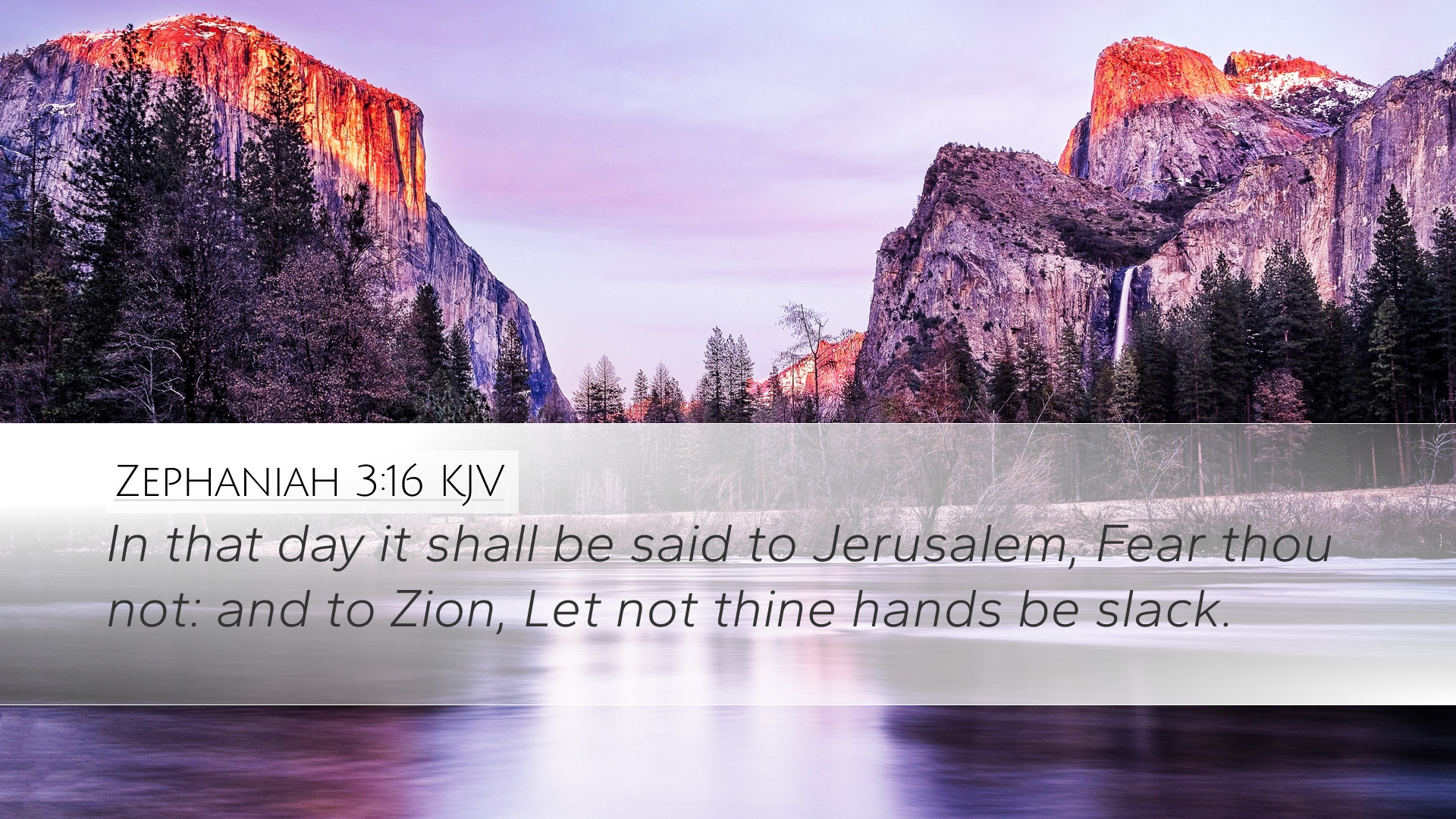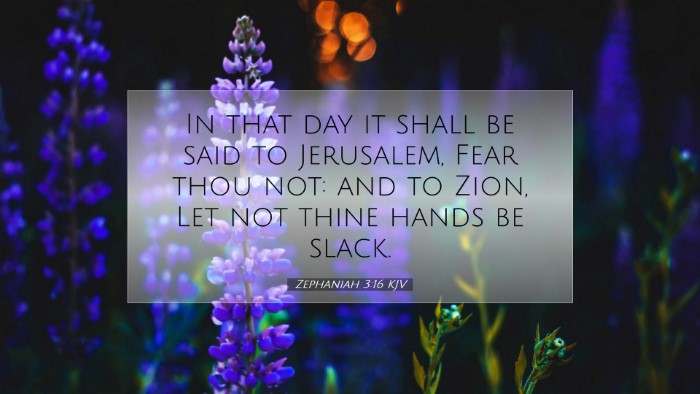Old Testament
Genesis Exodus Leviticus Numbers Deuteronomy Joshua Judges Ruth 1 Samuel 2 Samuel 1 Kings 2 Kings 1 Chronicles 2 Chronicles Ezra Nehemiah Esther Job Psalms Proverbs Ecclesiastes Song of Solomon Isaiah Jeremiah Lamentations Ezekiel Daniel Hosea Joel Amos Obadiah Jonah Micah Nahum Habakkuk Zephaniah Haggai Zechariah MalachiZephaniah 3:16
Zephaniah 3:16 KJV
In that day it shall be said to Jerusalem, Fear thou not: and to Zion, Let not thine hands be slack.
Zephaniah 3:16 Bible Commentary
Commentary on Zephaniah 3:16
Verse Text: "In that day it shall be said to Jerusalem: 'Do not fear, Zion; do not let your hands hang limp.'
Introduction
Zephaniah's prophetic messages resonate through time, offering both warning and hope to God’s people. As we delve into Zephaniah 3:16, we explore themes of reassurance, divine presence, and future redemption articulated through the prophet's vibrant imagery. The combined insights from public domain commentaries such as those by Matthew Henry, Albert Barnes, and Adam Clarke will provide a robust understanding suitable for pastors, students, theologians, and Bible scholars.
Contextual Overview
To fully appreciate Zephaniah 3:16, it is crucial to grasp the broader context of the book. Zephaniah prophesied during the reign of King Josiah, a time of spiritual decline mixed with a resurgence of reforms. The previous chapters in Zephaniah lay out God’s judgment against Judah and the nations surrounding it, revealing the consequences of unfaithfulness.
The Day of the Lord
Verse 16 refers to "that day," symbolizing the Day of the Lord—a recurring theme throughout the prophetic literature. Both judgment and deliverance are encapsulated in this phrase. Henry emphasizes that this passage heralds a promise of consolation for the people of Jerusalem, declaring that despite their previous transgressions, God’s mercy prevails.
The Comforting Words
“Do not fear, Zion; do not let your hands hang limp.” This directive underlines a remarkable shift in God's relationship with His people. Barnes notes that the phrase reflects God's intention to transform fear into confidence. The Israelites had experienced a tumultuous history filled with cycles of rebellion and despair; thus, the command to not fear serves as a counter to their emotional and spiritual fatigue.
Divine Presence and Peace
As we unpack this verse, Clarke provides further insight, stating that the presence of God is integral to the message. The reassurance expressed here implies that God is not merely distant but actively engaged in restoring his people. This divine intervention cultivates a sense of peace, thereby dispelling fear and helplessness.
Hands Hanging Limp
The imagery of "hands hanging limp" symbolizes despair and inaction, a profound reflection of the people's spiritual condition. This phrase suggests a lifelessness that contradicts the vitality mandated by faith. Here, Henry points out that the affirmation to “not let your hands hang limp” is an encouragement toward action and hope, restoring purpose amid uncertainty.
Broader Implications for God’s People
The commands given in this verse are timeless. They resonate with individuals and congregations struggling with despair, emphasizing that God’s presence can empower them to overcome. Just as Zephaniah addressed Jerusalem, today’s believers are reminded of God’s promises—a call to rise above circumstances through faith.
Application for Today's Believers
- Faith Over Fear: Like Jerusalem, believers are often confronted by fear. Embracing faith amidst turmoil is a radical act of trust in God.
- Call to Action: The directive to not let hands hang limp suggests engagement in active faith—through prayer, service, and community.
- Restoration and Hope: Just as God offered Jerusalem hope, modern believers can assure others of God’s restorative power in their lives.
Conclusion
Zephaniah 3:16 encapsulates the essence of God's promise to His people—an unwavering message of hope amid the certainty of impending judgment. The combined wisdom of Biblical scholars sheds light on the depth of this verse’s meaning and its profound implications for spiritual life today. By understanding the context, comforting words, and divine assurance present, pastors, students, and scholars can draw strength and direction for their ministries and personal faith journeys.


